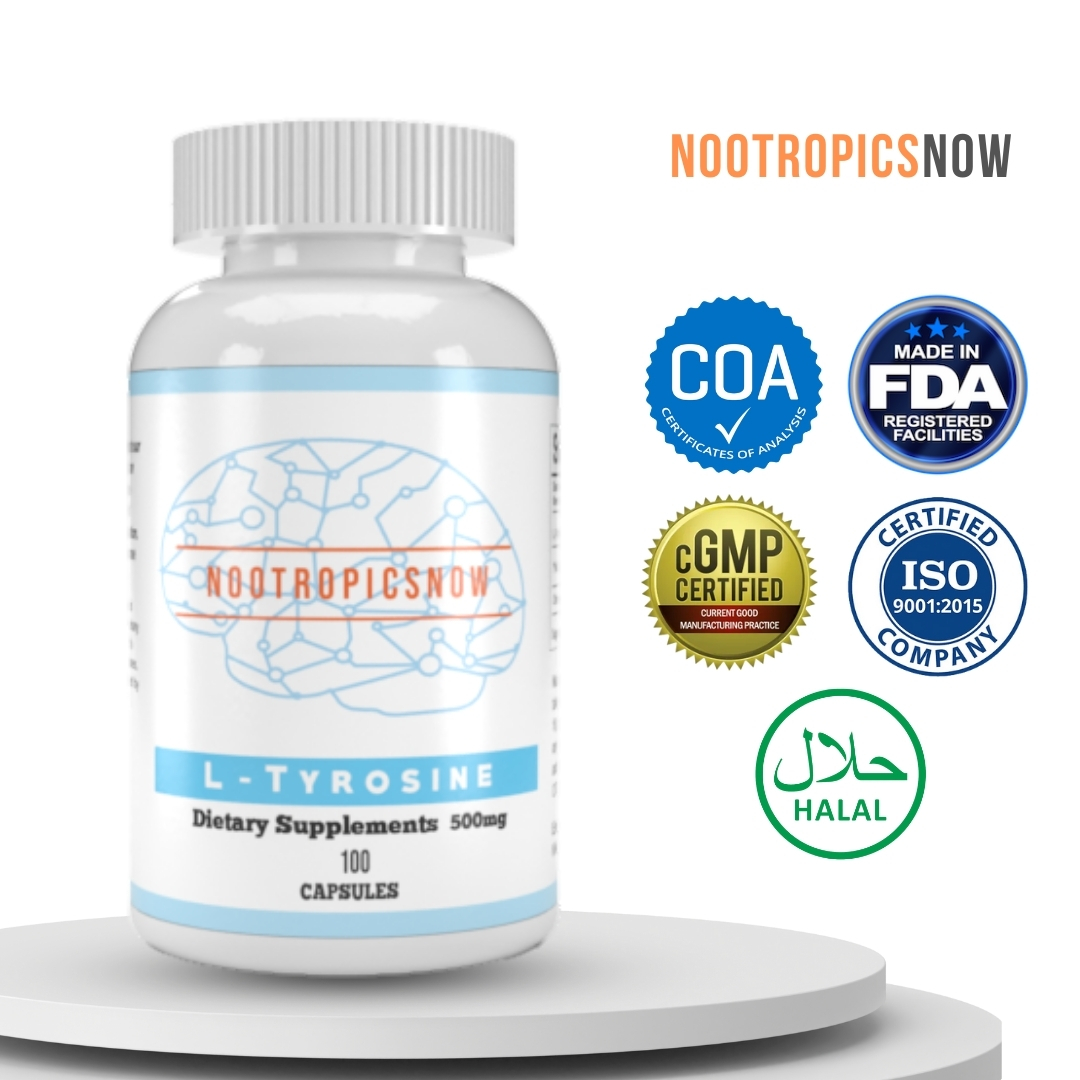L-Tyrosine: Benefits, Dosage & Uses

L-Tyrosine: Unlocking Your Cognitive and Physical Potential
L-Tyrosine is a fascinating amino acid gaining considerable attention in health and wellness circles. Understanding its role, benefits, and proper usage is vital for anyone seeking to optimize their cognitive and physical performance. This comprehensive guide delves deep into L-Tyrosine, exploring its functions, advantages, potential risks, and how it compares to other cognitive enhancers.
What is L-Tyrosine? A Building Block of Life
L-Tyrosine, often simply called tyrosine, stands out as a nonessential amino acid. Consequently, your body can synthesize it from another amino acid, phenylalanine. This process generally ensures you have enough, even if your dietary intake is limited. L-Tyrosine is a crucial component in building proteins, enzymes, and various other vital molecules. It’s especially critical for producing neurotransmitters, the chemical messengers of your brain, and hormones that regulate various bodily functions.
The Precursor to Key Neurotransmitters
L-Tyrosine serves as a precursor, the raw material, for several essential neurotransmitters. Dopamine, norepinephrine (noradrenaline), and epinephrine (adrenaline) are all synthesized from L-Tyrosine. These neurotransmitters are critical for mood regulation, cognitive function, and the stress response. Therefore, adequate L-Tyrosine levels are essential for optimal mental and emotional well-being.
A Crucial Component of Hormone Production
Beyond neurotransmitters, L-Tyrosine plays a vital role in thyroid hormone production. Thyroxine (T4) and triiodothyronine (T3), the primary thyroid hormones, regulate metabolism, energy levels, and overall growth and development. Without sufficient L-Tyrosine, thyroid function can be compromised, leading to a cascade of health issues.
Melanin Synthesis and Skin Health
L-Tyrosine also participates in melanin synthesis. Melanin is the pigment responsible for the color of our skin, hair, and eyes. While L-Tyrosine supplementation isn’t likely to dramatically change your complexion, it’s a necessary component for maintaining healthy pigmentation processes.
Benefits of L-Tyrosine: Elevating Performance
The diverse functions of L-Tyrosine translate into a range of potential benefits. These benefits span cognitive enhancement, mood regulation, improved physical performance, and support for individuals experiencing specific medical conditions.
Enhanced Cognitive Performance Under Stress
One of the most promising benefits of L-Tyrosine is its ability to improve cognitive function, particularly under stressful conditions. Studies suggest that L-Tyrosine can help maintain cognitive performance when faced with sleep deprivation, intense physical exertion, or exposure to cold temperatures. Soldiers, students, and professionals facing demanding situations may find L-Tyrosine supplementation beneficial.
For instance, research has demonstrated that L-Tyrosine can improve memory and reduce cognitive decline during periods of acute stress. This effect is likely due to L-Tyrosine’s role in synthesizing neurotransmitters depleted by stress.
L-Tyrosine: Unveiling the Power of This Amino Acid
L-Tyrosine is an amino acid our bodies synthesize from another amino acid, phenylalanine. Therefore, it’s conditionally essential; we must obtain it from diet or supplementation if phenylalanine is insufficient. This fascinating molecule is more than just a building block for protein. It’s critical for producing important brain chemicals, hormones, and even skin pigment. We’ll delve deeper into its roles, benefits, and considerations.
What Exactly is L-Tyrosine?
L-Tyrosine is a nonessential amino acid because our bodies can generally manufacture it. However, conditions of stress or underlying metabolic issues can hinder this conversion. When this happens, obtaining adequate amounts of tyrosine through food or supplements becomes essential. Structurally, it has a phenyl group and a hydroxyl group attached to the alpha carbon.
L-Tyrosine serves as a precursor molecule for synthesizing several vital compounds in the body. These include neurotransmitters like dopamine, norepinephrine, and epinephrine, as well as thyroid hormones and melanin, the pigment that gives skin and hair its color. Hence, L-tyrosine indirectly affects mood, stress response, metabolism, and appearance. The optimal levels of L-tyrosine support both physical and cognitive well-being.
The Multifaceted Roles of L-Tyrosine in the Body
L-Tyrosine exerts its influence through several mechanisms. Let’s examine its main functions:
The Potential Benefits of L-Tyrosine Supplementation
Given L-Tyrosine’s crucial roles in neurotransmitter and hormone synthesis, supplementing with it has several potential benefits:
L-Tyrosine Dosage and Considerations
Optimizing L-Tyrosine intake involves careful dosage planning and attention to individual factors.
Dietary Sources of L-Tyrosine
While L-Tyrosine is available as a supplement, it is also found in various foods. Incorporating these foods into your diet can help ensure adequate L-Tyrosine intake.
L-Tyrosine vs. N-Acetyl L-Tyrosine (NALT)
N-Acetyl L-Tyrosine (NALT) is an acetylated form of L-Tyrosine. It is often marketed as having better bioavailability than L-Tyrosine. However, research suggests that NALT may not be as effective as L-Tyrosine.
In summary, L-Tyrosine is generally considered the more effective and economical choice compared to NALT.
L-Tyrosine and Mental Health: A Deeper Dive
L-Tyrosine’s impact on mental health centers on its role as a precursor to dopamine and norepinephrine. These neurotransmitters are deeply involved in the following:
However, it is critical to consult with a healthcare professional before using L-Tyrosine as a treatment for any mental health condition. L-Tyrosine is not a substitute for conventional treatments and should only be used under medical supervision.
L-Tyrosine and Thyroid Health: A Closer Look
L-Tyrosine’s role in thyroid hormone production positions it as a potential supporting nutrient for thyroid health. Here’s how it connects:
Individuals with thyroid conditions should always consult with their doctor before taking L-Tyrosine supplements, as it can potentially interact with thyroid medications and affect thyroid hormone levels.
Conclusion: L-Tyrosine – A Powerful Ally for Well-being
L-Tyrosine is a conditionally essential amino acid with diverse functions and potential benefits. It’s a precursor to essential neurotransmitters, hormones, and melanin, thus influencing mood, stress response, metabolism, and even skin pigmentation. Supplementation may improve cognitive function under stress, elevate mood, boost energy levels, and enhance athletic performance. However, responsible use is paramount. Optimal dosage planning, awareness of potential side effects and interactions, and consultations with healthcare professionals are necessary for safe and effective implementation. By leveraging L-Tyrosine judiciously, individuals can enhance their mental and physical health.
If you’re looking for a L-Tyrosine supplement, consider the following:

View Product
Or this option:

View Product
Here is a final option to consider:
View Product-Brain-Boost-Amino-Acid-Mood-Stress-Cognitive-Supplement-i.202321183.9309302097)

